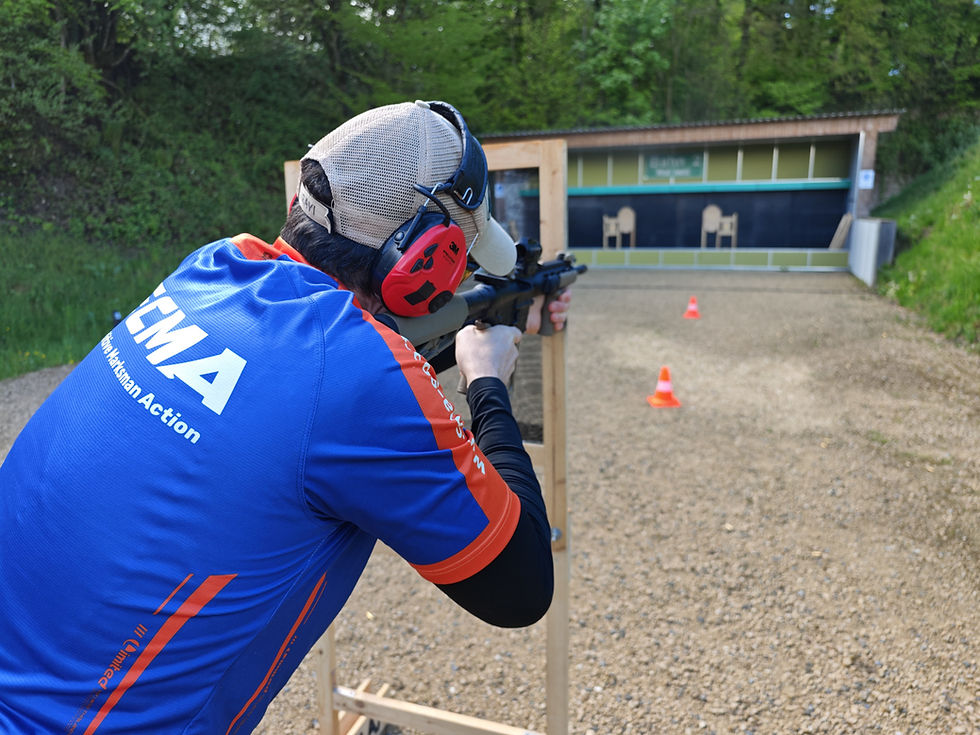Check Your Hits!
- Andy

- Sep 13, 2023
- 4 min read
A one is not a one! And I can prove it.
Of course, in mathematics 1=1 is true, but in shooting, this is not the case. What I am trying to say here only makes sense when using some kind of points down scoring system on paper targets, like we use, for example, in CMA. If you are used to hit factors and alpha, charlie, delta one would have to say charlie is not equal to charlie but that's less catchy, I guess.
Have you ever been at a match were scoring already starts when the shooter is still busy? Probably yes. Of course they tell you to nominate somebody to check your hits for you. But even then, you never get to see your hits on certain targets yourself. And you can't assess if you need to change something for the next stage.
If I see my hits, I can learn something from that, adapt my behavior and try to influence my overall result in the right direction.
Another question: have you ever seen guys practicing without patching the targets? I have, and I think they mostly just waste ammo. The purpose of shooting is hitting and if you are too lazy to check and patch your hits then you might as well dry fire. Ammo is too expensive to just make noise with it, at least for me.
Some guys do a little better, they at least patch outside of the zero (or alpha) and only leave the rest untouched.
After some shots one might as well just shoot in the general direction of the berm, since there's no way to tell which hit belongs to which exercise. But back to the competition situation.
0 is not 0
Let's say I just performed an all zero stage and I am really excited about that. Fine.
I check my hits and they all are a hair apart from each other and right in the center of the zero area. That's really good shooting! My conclusion would be that I can actually speed up, lower my raw time and most probably still manage to get zero or very low points down on the next stage. My total score should become a lot better than if I just would continue with what I was doing so far.

However, if I have an all zero stage but many of my hits are right at the edge of the zero area, maybe even close to a miss, then that was me just being lucky. If I speed up on the next stage, my total score might actually get worse, maybe even a lot worse.
It's not enough to just look at the numbers but you actually should see and assess your hits in order to adapt your shooting sensibly and influence your results. Check whether your zero is a Perfect Shooting Zero, which is just that, or a Lucky Zero, which might be close to catastrophe.
1 is not 1
Similarly, 1 is not 1, as you suspected.
There's the Unlucky One: a little more focus on the front sight, a little tighter grip, a slightly straighter trigger pull and the Unlucky One will become a zero on the next stage.

But then there's the Bad Shooting One: just a little more focus will not suffice to correct that and make it a zero on the next occasion. This one needs a lot more focus or it will quickly turn into a three or even worse.
3 is not 3
By now it should be obvious that not all 3s are equal.
The Very Unlucky Three is kind of a cousin of the Unlucky One. The difference in shooting error is not that big and one should not fall into a deep depression about it. Just get your head into the game, focus on the five fundamentals and the Very Unlucky Three might be gone from your score for the remainder of the match.

On the other hand, if I managed to produce a Pathetic Shooting Three, then I really need to get my act together or my score will deteriorate dramatically over the rest of the day. The Pathetic Shooting Three and the Lucky Zero are both close relatives to a miss and should serve as a unmistakable wake up call.
A Miss is a Miss
We can't really analyze a miss can we? It leaves no mark on the target and could be very close or meters away. So: 5 equals 5 in any case. The only thing I can do is ask myself if I remember my front sight not being on target when the pistol went bang or not. If I do, there's hope, If I don't then - well it's maybe better to just survive and fight another day.
Bottom line
There's a huge difference whether I shot, say, 3 times an Unlucky 1 or once a Pathetic Shooting 3. The total score is the same, but the reasons for the result and my possible corrections are completely different.
If you got up early in the morning, made your way to the range and will stay there all day, you might as well try to produce the best result possible. One way to do that is, in my experience, to check your hits!
Become a Better Shooter!
Sincerely, Andy




Comments